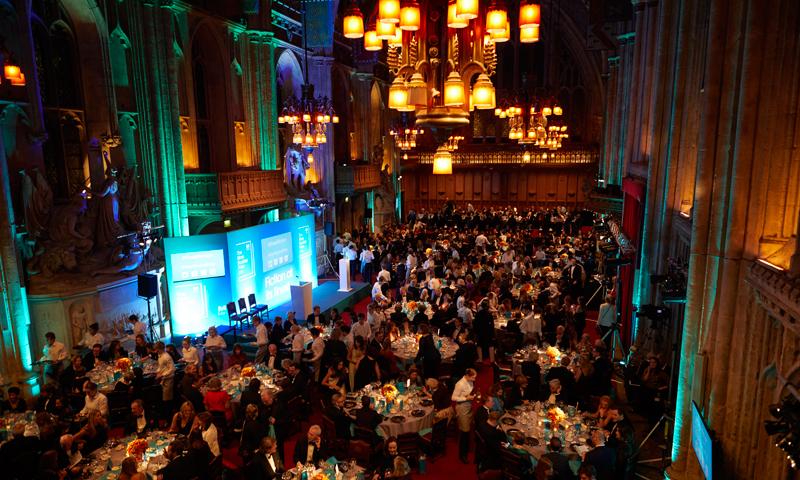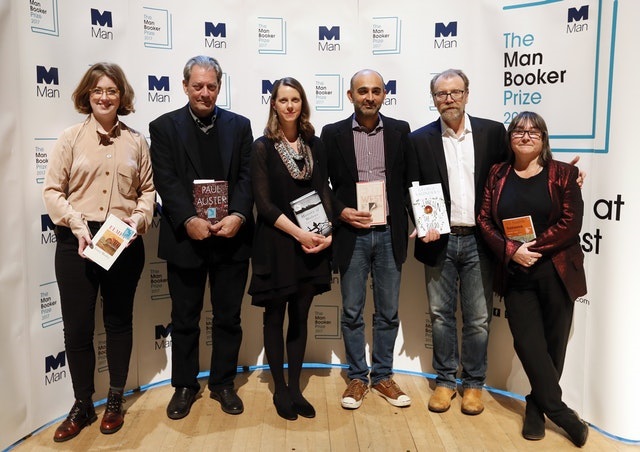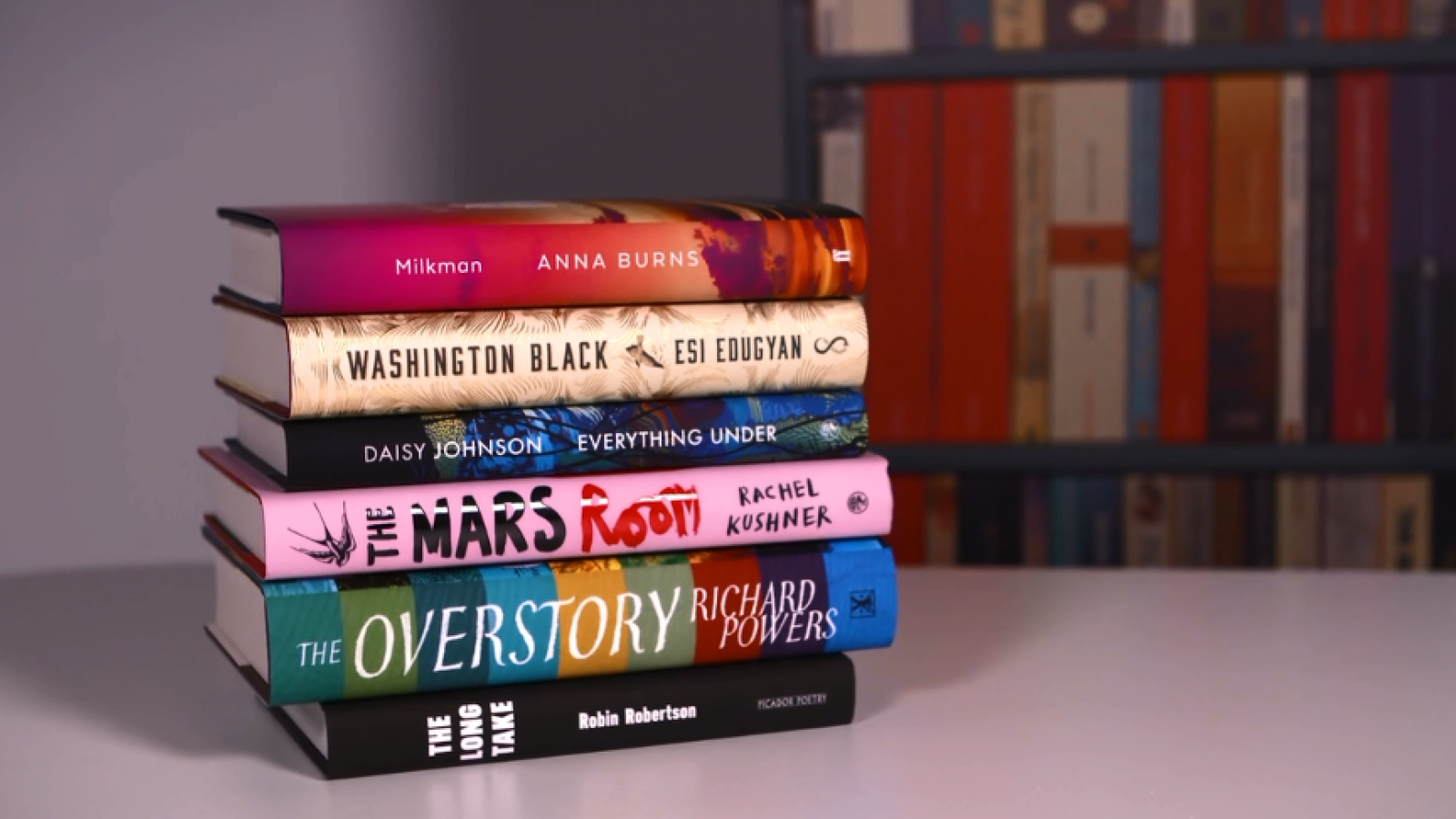Barneys, Books and Bust Ups, BBC Four review - the Booker Prize at 50 | reviews, news & interviews
Barneys, Books and Bust Ups, BBC Four review - the Booker Prize at 50
Barneys, Books and Bust Ups, BBC Four review - the Booker Prize at 50
The award's half-century has brought scandals aplenty, welcome publicity pay-offs, too

You had to keep your eyes skinned. Was that Iris Murdoch or AS Byatt, Kingsley Amis or John Banville, Margaret Atwood or Val McDermid – maybe, even, Joanna Lumley? Tables as far as the eye can see, dressed with white tablecloths and crowded with wine glasses.
Barneys, Books and Bust Ups was a vastly entertaining documentary of the (Man) Booker Prize’s first 50 years, narrated in the soothing tones of Kirsty Wark. We witnessed vignettes from the annual black-tie knees-up, when those mole-like creatures – writers working away in solitude creating novels – are illuminated for just a moment by the light of celebrity. We heard from the critics, John Carey at the fore, lamenting the lack of luminaries such as Robert Harris from the notorious lists (because popularity may be seen as somewhat shameless), and Robert McCrum, long-time literary editor of the Observer, as well as agents, publishers, and James Daunt, the bookseller. And there was a wonderfully embarrassing moment when Selina Scott interviewed Angela Carter but didn’t recognise her.
We had Julian Barnes, rumoured to be cross about nominations but no win, calling it 'posh bingo' The Booker, its various name and rule changes notwithstanding, is part of British life, perhaps the greatest prize in the English language. Winning is life-changing, with the roll call featuring a handy honours list of English fiction of the past half-century. The prize is manna for literary publicity, scandal, controversy, but with a big pay-off both intellectually and commercially. The Canadian Yvan Martel’s Life of Pi, the winner in 2013, has sold 13 million copies – and been made into a movie, also transforming the fortunes of Canongate, Jamie Byng’s small Scottish publishing company. The young and hitherto unknown Salman Rushdie’s Midnight’s Children sold a million copies after its 1981 victory.
Its long term administrator Martyn Goff artfully leaked some confidential controversies among its annually appointed five judges, who often have to read over 150 novels in the course of the Booker Year (November 30 to the following December 1). It made for a romp through the book prize that everyone loves to hate (but still debates). It may be a war of words, but that doesn’t mean it isn’t painful as well as inspiring. We had Julian Barnes, rumoured to be cross about nominations but no win (until he did in 2011 for The Sense of an Ending), calling it “posh bingo”. There was Julia Neuberger sounding off as one of the judges on how much she hated James Kelman’s expletive-jammed 1994 low-life Glaswegian novel How Late It Was, How Late. It was ever thus: Malcolm Muggeridge, St Mug, ever the noisy moralist, resigned in 1971 because he thought the entries pornographic. The prize has gone from £5,000 in its first year – his daughters told us PH Newby probably used it to pay off the mortgage – to £50,000 now. It has been political, with handsome and privately rich John Berger, who won for his experimental novel G telling off Booker, the company whose fortune came from Caribbean sugar, for colonialism, and donating his prize money to good causes in the West Indies, and possibly the Black Panthers (which the programme did not mention). Booker sponsorship eventually gave way to investment firm Man, and it became Man Booker.
The prize has gone from £5,000 in its first year – his daughters told us PH Newby probably used it to pay off the mortgage – to £50,000 now. It has been political, with handsome and privately rich John Berger, who won for his experimental novel G telling off Booker, the company whose fortune came from Caribbean sugar, for colonialism, and donating his prize money to good causes in the West Indies, and possibly the Black Panthers (which the programme did not mention). Booker sponsorship eventually gave way to investment firm Man, and it became Man Booker.
It all came about, we learnt, from the now octogenarian publisher Tom Maschler’s youthful admiration for French literary life. He had spent a lot of time in Paris where there was the Prix Goncourt, and a winner’s publisher would see victory multiply sales by some ten times. Maschler turned to Booker McConnell, which had diversified into buying up author’s copyrights – and what authors! Ian Fleming, Agatha Christie and Robert Bolt, for starters – and convinced them to put something back. They did, in the form of £5,000 for the winning writer of a novel in English; nice that the company was called Booker, too. Initially it included citizens of Ireland, the British Commonwealth and South Africa; now, as long as you write in English and are published in the UK you can be a citizen of anywhere, so the Americans have arrived. (Pictured above, the 2017 finalists: winner George Saunders, second from right) In its first year, Newby’s winner Something to Answer For shot to the top of the Sunday Times bestseller list – the first Booker bounce. In the 1980s it came of age and the Booker Prize became a kind of prize fight, its authors celebrities. Anthony Burgess was filmed famously sulking about the small provincial parochial prize as he lost out to William Golding. There was a furore, too, when Vikram Seth’s A Suitable Boy was not on any list, long or short. (Pictured above, the 2018 contender novels)
In its first year, Newby’s winner Something to Answer For shot to the top of the Sunday Times bestseller list – the first Booker bounce. In the 1980s it came of age and the Booker Prize became a kind of prize fight, its authors celebrities. Anthony Burgess was filmed famously sulking about the small provincial parochial prize as he lost out to William Golding. There was a furore, too, when Vikram Seth’s A Suitable Boy was not on any list, long or short. (Pictured above, the 2018 contender novels)
Drink fuelled a lot. John Banville vividly described being totally drunk at the banquet when he was first on a shortlist – his wife coached him into practicing just saying thank-you, but he wasn’t chosen; he won his second time round (The Sea, 2005). He had a feeling his luck was in when he saw a lone duck at the Serpentine fight off a horde of gulls to get the bread (he, of course, was the duck). Hilary Mantel made a vivid, formidable and thrilled appearance, winning for Wolf Hall in 2009 and Bring Up the Bodies in 2012 – only the third author, and the first woman, to win the Booker twice. Peter Carey has also won twice. It is like being run over by a truck, he confided.
But what the Booker has really done, as Jon Morrice’s entertaining and fact-filled programme really showed, is to make books news, contributing perhaps surprisingly to the survival of publishing, bookshops, and – guess what? – readers.
The future of Arts Journalism
You can stop theartsdesk.com closing!
We urgently need financing to survive. Our fundraising drive has thus far raised £49,000 but we need to reach £100,000 or we will be forced to close. Please contribute here: https://gofund.me/c3f6033d
And if you can forward this information to anyone who might assist, we’d be grateful.

Subscribe to theartsdesk.com
Thank you for continuing to read our work on theartsdesk.com. For unlimited access to every article in its entirety, including our archive of more than 15,000 pieces, we're asking for £5 per month or £40 per year. We feel it's a very good deal, and hope you do too.
To take a subscription now simply click here.
And if you're looking for that extra gift for a friend or family member, why not treat them to a theartsdesk.com gift subscription?
more TV
 theartsdesk Q&A: director Stefano Sollima on the relevance of true crime story 'The Monster of Florence'
The director of hit TV series 'Gomorrah' examines another dark dimension of Italian culture
theartsdesk Q&A: director Stefano Sollima on the relevance of true crime story 'The Monster of Florence'
The director of hit TV series 'Gomorrah' examines another dark dimension of Italian culture
 The Monster of Florence, Netflix review - dramatisation of notorious Italian serial killer mystery
Director Stefano Sollima's four-parter makes gruelling viewing
The Monster of Florence, Netflix review - dramatisation of notorious Italian serial killer mystery
Director Stefano Sollima's four-parter makes gruelling viewing
 The Diplomat, Season 3, Netflix review - Ambassador Kate Wyler becomes America's Second Lady
Soapy transatlantic political drama keeps the Special Relationship alive
The Diplomat, Season 3, Netflix review - Ambassador Kate Wyler becomes America's Second Lady
Soapy transatlantic political drama keeps the Special Relationship alive
 The Perfect Neighbor, Netflix review - Florida found-footage documentary is a harrowing watch
Sundance winner chronicles a death that should have been prevented
The Perfect Neighbor, Netflix review - Florida found-footage documentary is a harrowing watch
Sundance winner chronicles a death that should have been prevented
 Murder Before Evensong, Acorn TV review - death comes to the picturesque village of Champton
The Rev Richard Coles's sleuthing cleric hits the screen
Murder Before Evensong, Acorn TV review - death comes to the picturesque village of Champton
The Rev Richard Coles's sleuthing cleric hits the screen
 Black Rabbit, Netflix review - grime and punishment in New York City
Jude Law and Jason Bateman tread the thin line between love and hate
Black Rabbit, Netflix review - grime and punishment in New York City
Jude Law and Jason Bateman tread the thin line between love and hate
 The Hack, ITV review - plodding anatomy of twin UK scandals
Jack Thorne's skill can't disguise the bagginess of his double-headed material
The Hack, ITV review - plodding anatomy of twin UK scandals
Jack Thorne's skill can't disguise the bagginess of his double-headed material
 Slow Horses, Series 5, Apple TV+ review - terror, trauma and impeccable comic timing
Jackson Lamb's band of MI5 misfits continues to fascinate and amuse
Slow Horses, Series 5, Apple TV+ review - terror, trauma and impeccable comic timing
Jackson Lamb's band of MI5 misfits continues to fascinate and amuse
 Coldwater, ITV1 review - horror and black comedy in the Highlands
Superb cast lights up David Ireland's cunning thriller
Coldwater, ITV1 review - horror and black comedy in the Highlands
Superb cast lights up David Ireland's cunning thriller
 Blu-ray: The Sweeney - Series One
Influential and entertaining 1970s police drama, handsomely restored
Blu-ray: The Sweeney - Series One
Influential and entertaining 1970s police drama, handsomely restored
 I Fought the Law, ITVX review - how an 800-year-old law was challenged and changed
Sheridan Smith's raw performance dominates ITV's new docudrama about injustice
I Fought the Law, ITVX review - how an 800-year-old law was challenged and changed
Sheridan Smith's raw performance dominates ITV's new docudrama about injustice
 The Paper, Sky Max review - a spinoff of the US Office worth waiting 20 years for
Perfectly judged recycling of the original's key elements, with a star turn at its heart
The Paper, Sky Max review - a spinoff of the US Office worth waiting 20 years for
Perfectly judged recycling of the original's key elements, with a star turn at its heart
